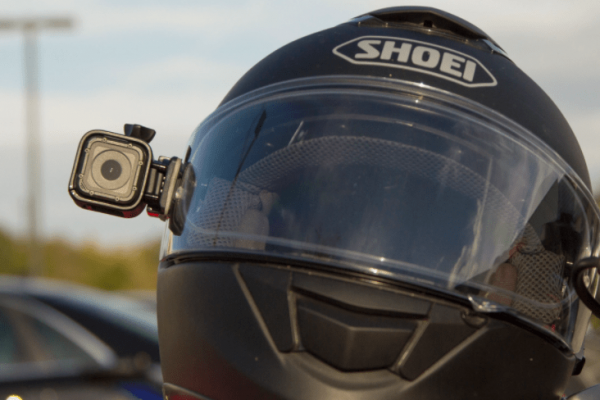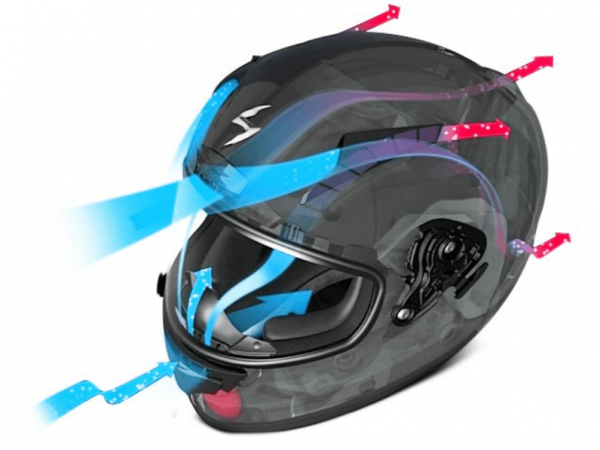- Updated May 9, 2022
You’re no doubt familiar with helmet-mounted action cameras, but do you know the motorcycle helmet camera laws in the UK? GoPro’s make capturing high-adrenaline footage a breeze, but just how legal is it to ride around with one?
Let’s discuss the legality surrounding motorcycle helmet cameras and whether it’s worth investing your hard-earned cash into one.

Are Motorcycle Helmet Cameras Legal?
Motorcycle helmet cameras are legal as long as they are mounted without compromising the helmet’s structural integrity.
In layman’s terms, helmet cameras are totally above board unless fixed in place by drilling holes into the helmet’s shell.
Things to Consider When Mounting a Camera to Your Helmet
Aerodynamics play a huge role in motorcycling, so where you choose to mount the camera will have an impact! Here are two things to keep in mind:
Airflow
Despite either side of the helmet being the most common mounting position, it’s actually the most detrimental to airflow.

Motorcycle helmets are designed aerodynamically to ensure that air flows symmetrically around them. A typical GoPro-sized camera will experience a drag force of up to 2kg at motorway speeds, quickly leading to neck fatigue if mounted on one side.
We recommend the increasingly popular ‘chin mount’ if possible, as this will have little effect on the helmet’s aerodynamic properties. If this isn’t an option, then we recommend positioning it centrally on the top of your lid.
Stability
For your safety and those around you, making sure your camera is securely attached to your helmet is incredibly important. A GoPro hurtling through the air is a scary prospect and one that has the potential to do severe damage.
We recommend keeping your mounting solution simple and using as few extension arms as possible. This will not only reduce the number of parts that have the potential to fail but also keep the weight to a bare minimum.
We’ve tried dozens of mounting techniques here at Moto Geek, and our favourite solution to this day is Sugru.
Sugru is a mouldable glue designed to permanently bond to pretty much every type of surface. Securing an action camera to your helmet has never been simpler, and this method removes the need for any extensions whatsoever!
Can The Police Seize a Motorcycle Camera as Evidence?
Section 19 of the Police and Criminal Evidence (PACE) Act 1984 states that police officers can seize evidence in a vehicle or premises.
Now, you would be well within your right to argue that an action camera attached to your helmet (rather than the motorbike itself) technically doesn’t fall within these parameters. While this may be true, you’ll have a hard time convincing a police officer who has witnessed you committing a crime with a camera strapped to your head.
Ultimately, the police can and will seize your camera if they believe it contains evidence relating to an offence.
If you frequently ride in a lively manner, choosing to live without a helmet camera is probably a wise decision. As if committing an offence wasn’t already bad enough, recording yourself doing so is really asking for trouble!
What Should I Do If The Police Seize My Camera?
If a police officer insists on seizing your helmet camera there and then, make sure to get a receipt that includes the following information:
- Date and time
- Officer’s name, position and station
- Device make, model and serial number
- Number of files stored on the device
After your camera has been seized, we recommend contacting a solicitor as soon as possible for legal advice.
Can Helmet Cam Footage Be Used as Evidence In Court?
Courts in the UK have the ability to use helmet cam footage as a source of objective, indisputable evidence.
For example, in the event of a road traffic accident, video evidence leading up to and during the incident could be used to determine who is liable.
While helmet cam footage can be helpful to prove your innocence, it’s important to remember that it can also incriminate you. If the police seize your helmet camera on suspicion of an offence, and the footage happens to confirm their suspicions, this could lead to a prosecution.
Final Thoughts
Helmet cameras are more accessible and packed with features than ever before. The idea of immortalising your ride-outs on video is enticing, but this footage could be damning if used against you.
If you ride sensibly, then a helmet camera (like the GoPro Hero 10) is almost certainly a worthy addition to your everyday riding gear!
